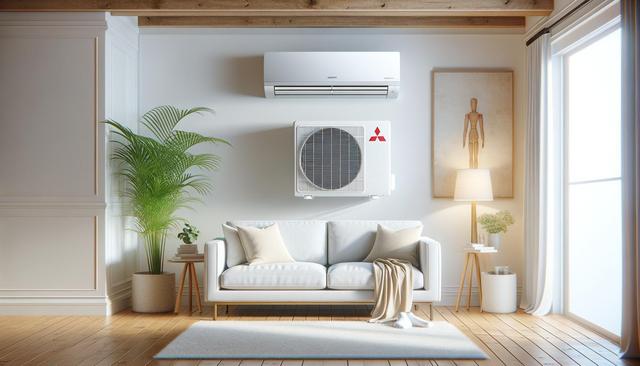What is a Mitsubishi Mini Split System?
A Mitsubishi mini split system is a type of ductless HVAC solution that allows for both heating and cooling in residential and commercial spaces. Unlike traditional systems that rely on ductwork, mini splits consist of an outdoor unit and one or more indoor air-handling units. These are connected by refrigerant lines, making the installation process more flexible and less invasive. Mitsubishi is known for producing high-quality systems that emphasize energy efficiency, quiet operation, and precise temperature control.
The appeal of mini split systems lies in their ability to offer zoned comfort. This means you can individually control the temperature in different areas of your home, potentially reducing energy consumption. They are particularly useful in older homes without existing ductwork, home additions, and rooms that are difficult to heat or cool using a central system.
Benefits of Residential Mitsubishi Mini Split Installation
There are numerous advantages to opting for a residential Mitsubishi mini split installation. One of the most significant benefits is enhanced energy efficiency. These systems use inverter-driven compressors that adjust the speed of the compressor to meet the demands of the space, rather than turning on and off like traditional HVAC systems.
Some key advantages include:
- Flexible installation options for different room layouts and designs
- Quiet indoor operation, ideal for bedrooms and home offices
- Improved indoor air quality due to built-in filtration systems
- Lower energy bills through zoned temperature control
In addition to performance, Mitsubishi systems are built with durability in mind. Many homeowners appreciate the minimal maintenance requirements and long-term reliability of these units. Choosing a professional for the residential Mitsubishi mini split installation ensures optimal performance and longer life span of the system.
Understanding Mitsubishi Mini Split Cost Installed
When evaluating the Mitsubishi mini split cost installed, several factors need to be taken into account. The final price can vary significantly depending on the number of indoor units required, the size and layout of your home, and any additional electrical or structural work needed for proper installation.
On average, you can expect costs to include:
- Equipment cost (outdoor and indoor units)
- Installation labor and materials
- Electrical upgrades or permits if required
- Optional features such as Wi-Fi connectivity or enhanced air filtration
It’s worth noting that while the upfront cost may be higher than traditional HVAC systems, the long-term savings through energy efficiency and reduced maintenance often make them a worthwhile investment. To get an accurate idea, always consult a qualified HVAC professional who can assess your specific needs and provide a detailed quote.
Cost Guide for Mitsubishi Mini Split Systems
A detailed cost guide for Mitsubishi mini split systems can help homeowners plan and budget effectively. While initial costs can range widely, most residential installations fall between mid to high four-figure amounts depending on system complexity and home requirements.
Here’s a rough breakdown of what a typical cost guide for Mitsubishi mini split might include:
- Single-zone systems: Generally more affordable and simpler to install, ideal for small spaces or single rooms.
- Multi-zone systems: Suitable for larger homes with varied heating and cooling needs; these systems require more indoor units and a more complex setup.
- Installation extras: Includes wall brackets, drain lines, or additional insulation, all of which add to the final cost.
Rebates and incentives may also be available through local utility providers or government energy efficiency programs. These can significantly offset the Mitsubishi mini split cost installed, making it more accessible for homeowners focused on long-term value and sustainability.
Choosing the Right Mitsubishi Mini Split for Your Home
Selecting the right Mitsubishi mini split system for your home involves more than just picking a model. It requires understanding your home’s specific heating and cooling needs, evaluating room sizes, and considering your overall energy goals. A professional contractor can perform a load calculation to determine the right capacity for each zone in your home.
Important factors to consider include:
- Number of zones you need to control
- Size and insulation level of each room
- Desired features like remote control or smartphone connectivity
- Your budget for initial installation and long-term operation
Consulting with a certified HVAC specialist ensures you not only get a properly sized system but also benefit from expert advice on placement, efficiency, and maintenance. This makes the process smoother and helps avoid costly mistakes that can affect the system’s performance over time.

Leave a Reply